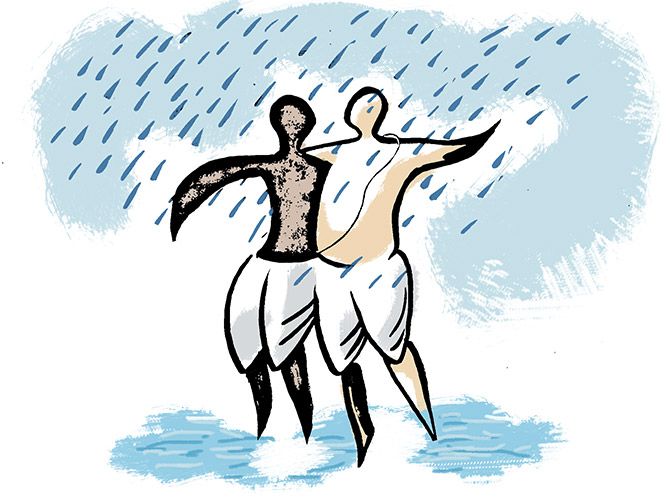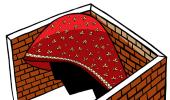What years of education, social messaging and reservations couldn't accomplish, water scarcity did in one summer, says Geetanjali Krishna.
Illustration: Dominic Xavier/Rediff.com

In rural Uttar Pradesh, especially in the heart of Bundelkhand, the annual summer drought regularly wreaks economic and emotional havoc in the lives of villagers.
Some months ago, I visited the Mahuee village in Banda district to document the interventions of WaterAid, an international NGO that works on issues relating to water, sanitation and hygiene across the country.
I discovered that the drought actually had an unintended positive fallout in this underdeveloped village.
Here's what I saw.
Mahuee is ranked high among the villages worst affected by groundwater depletion in Banda district.
Locals attest that in the last decade, water shortage in the village has worsened every summer, even though the region receives a reasonable amount of rain during monsoon.
Not only wells and tube wells, but even village ponds dry up as the temperature shoots up to nearly 50 degrees Celsius.
Deep fissures develop in the fields and the villagers have little water for themselves, let alone for their livestock.
WaterAid has successfully set up rooftop rainwater harvesting systems to recharge wells and tube wells in the area.
When they approached Mahuee's gram pradhan Malkhe Srivas to build a similar project in the village in 2017, he was excited to help.
He even offered to set the harvesting system on his rooftop as he lived next to one of the wells in the village.
But there was a hitch.
In the heartlands of Uttar Pradesh, caste fissures tend to run deep and Srivas is a Dalit.
"To avoid even accidentally touching lower caste people like me," he told me, "some of my upper caste neighbours wouldn't even draw water from the well at the same time as I did."
He wondered what they would say when they heard that water from a Dalit's rooftop was going to recharge a common well.
Even if the harvested rainwater from his rooftop managed to do the job, there was a strong possibility his higher caste neighbours would not even use that water.
After much discussion, they decided to go ahead with the plan anyway.
Not unexpectedly, the higher caste villagers were horrified at the idea.
How could water recharged by rainwater from a Dalit's rooftop be 'clean', they asked.
As it turned out, the recharge system successfully prevented the well from drying out the following summer while other water sources dried up.
"People were amazed to see that this well continued to have abundant water throughout the summer," Srivas recounted.
Eventually, his upper caste neighbours were compelled to set aside their caste prejudices and draw water from the well.
"Today, the very people who'd earlier criticised me are clamouring for similar recharging systems to be put up on their roofs as well," he said.
"We've now built two more recharge pits independently, and as the pradhan, I plan to construct such pits near all water sources in the village in the year ahead."
And so the drought proved to be a social leveler in Mahuee.
What years of education, social messaging and reservations couldn't accomplish, water scarcity did in one summer.
The caste taboo, once broken, has somewhat reduced in importance now.
"Now everyone drinks water from the well recharged by the rainwater from my rooftop," Srivas told me.
"I'd not believed this would happen in my lifetime."











